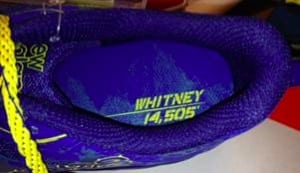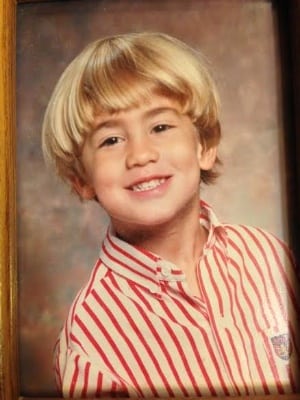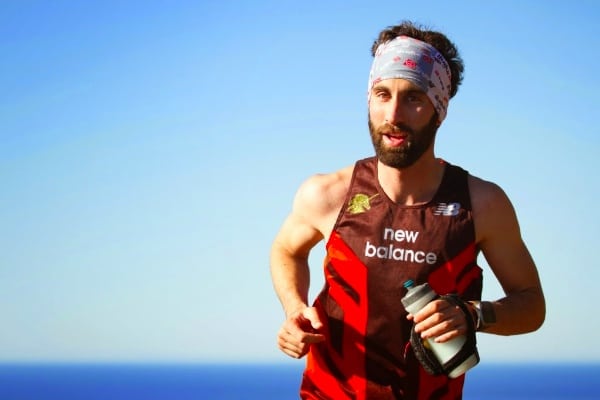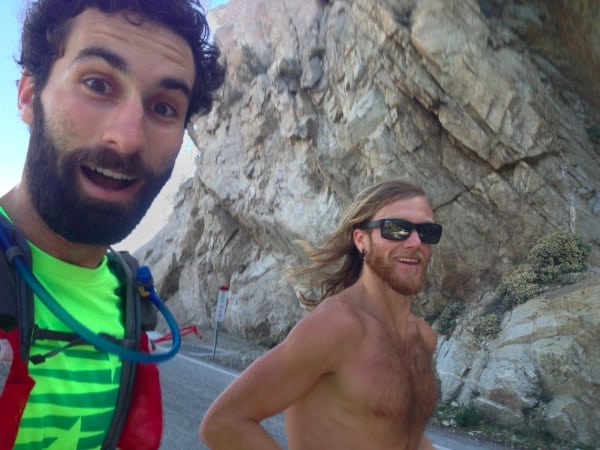 I tracked down Dominic Grossman, the moustachioed meanderer of the San Gabriel Mountains in Southern California, to talk past, present, and future in the life of one of U.S. ultrarunning’s premier dudes.
I tracked down Dominic Grossman, the moustachioed meanderer of the San Gabriel Mountains in Southern California, to talk past, present, and future in the life of one of U.S. ultrarunning’s premier dudes.
iRunFar: Dominic, you’ve been doing some consistent big-mileage weeks as part of your Western States 100 training. How’s the body holding up?
Dominic Grossman: Good until this Monday. I was running on a silly piece of singletrack and I took a little spill and banged up my peroneous longus—which is the outside of your shin which attaches to the outer metatarsal. So I’ve been trying to get that to quiet down for the last couple of days and hopefully, by next week, I’ll be good to go again. Apart from that accident, I was actually doing really well. I had my 10 weeks of over 100 miles and then I toned it down for a week to let my body recover and then I was going to head into May pretty strong for WS100 and then have a gradual taper down after the last week in May.
iRunFar: Cool. So your block of ten 100-mile weeks—is that the most running you’ve done over a extended time frame like that?
Grossman: Yeah, the only other thing I’ve done before was last year when I done a four- or five-week build for Angeles Crest [100 Mile] where I topped out at 150 miles. That was actually more painful because it was a little more drastic. This was a little more disciplined. It worked out pretty well. I got some of my times down and didn’t really have an injuries to speak of—just some niggles here and there. Last year, when I tried to hit 150 miles of peak running, I was right on the edge of injury.
iRunFar: Tell me a little about the discipline. Was it tough to get through those 10 weeks?
Grossman: It definitely wasn’t second nature to be out there every couple of days, right on top of your mileage and not miss a beat. More of my life here in LA [Los Angeles] is scattered—I go to work nine hours a day, I have an hour of commuting, then I’ve got friends that I hang out with. My girlfriend actually likes to spend quality time, too, and not just run with me. I’ve visited Joshua Tree [National Park] with other friends, for example, and it’s not really a great place to run—but I’d go there and shuffle through some sand and hang out with them. I actually came back one Sunday night and ran 30 miles. It wasn’t easy, but it kind of got to a point where I had a consistency of adrenaline and, if I didn’t get my miles in for the week or the day, I felt trapped. I’d get restless legs.
iRunFar: It must be tough now, though, being injured. Are your legs chomping at the bit, raring to go?
Grossman: In my head I have mood swings. Outwardly, I’m quite a mellow guy but in my head I’m like, This is stupid, why aren’t I running? What’s wrong with me? I’m going to get fat and out of shape in the next 10 minutes if I don’t run! [laughs]
iRunFar: [laughs] So are your legs are doing an Irish jig as you’re talking to me now?
Grossman: Yeah, there just moving all around… Actually it happens at work, I’m listening to music and they’re going crazy. Normally they’re a little more tired. [laughs] Everyone talks about the fun of getting in shape and being in the shape of your life, but, if you don’t have a race to knock you back, you’re all wired. I think I’ll be back to normal next week—my focus for Western States will be a bit more speedwork and sharpening up my legs. Also a bit more volume, I think I can sustain a bit more. Four weeks seems like a short period of time compared to 10 weeks so I think I’ll be good.
iRunFar: Great. You’ve been running ultras for six years now and you’ve mentioned on your blog that if someone asked you what the essence of the sport is you would say it’s about knowing yourself really well. What have you found out about yourself that you didn’t necessarily know before you started running ultras?
Grossman: Yeah, I think it’s an understatement about knowing yourself. Six years ago when I started, my identity was that I was tired of the track and cross country I ran in college, and I wanted this pure essence of just endurance. The change was that ultrarunning just seemed too far to be hyper-competitive. Nowadays it’s right back to where it was for me with my college running; I’m really analytical.
Over time I went from just trying to finish, just see what I could pull off. My first three races were only a month each apart. I did a 50k with no experience, then a did a 50 mile a month later and then a 100 miler a month after that. I just wanted that pure adventure experience.
Then, as I wanted to get back into the competitive aspect of ultrarunning and see how I could run against the best in the country and the world, it became this thing of, Okay, when I feel pain what’s my reaction? How do I rationalise slowing down and being in a lot of pain? Or do I define myself as someone who’s only going to run hard at the end or something? I like to think of myself as more of a purist that runs hard from start to finish, but sometimes I can’t do it.
iRunFar: Is that analytical side of you something that you’ve always had? I’m talking before running, when you were a kid growing up?
Grossman: Yeah, actually I think so. My dad was an engineer and when stuff would break in the house, we’d fix it together. It sort of became the knack that I had. Through high school and college I went down the engineering path. Engineers are famous in ultrarunning as being very, very meticulous planners. Tim Twietmeyer is an engineer and he would analyse every workout he had for months and months before each WS100 and then he’d just be tweaking, figuring it out, and nailing it on race day. That’s the engineer mindset of planning and perfecting—there’s no such thing as the perfect machine but engineers are going to try and make one regardless.
iRunFar: Growing up in Southern California must have been pretty cool. How was the young Dominic? Were you always into sports?
Grossman: Yeah it was cool. I grew up swimming, playing water polo, surfing, and skateboarding. Then there was this program called Students Run LA in high school, my freshman year. They’d take you to a 5k, 10k, half marathon and, finally, the LA Marathon. As a freshman and never having run before, I got intrigued by it—and my sister dared me. I thought I was tough enough to handle it. There wasn’t a lot of structured coaching but, again, I applied my analytical side to figuring out what works and what doesn’t. My first marathon was brutally painful and I ran it in four and a half hours—which at 14 years old is decent, but it was also extremely painful! After a couple of years I was able to lower it down to 3:17. Firstly I just wanted to know about every aspect of running and not worry about the mistakes I’d make—I was just trying to experience it as fast as I could.
iRunFar: And you’ve pretty much not stopped running since?
Grossman: Yeah. In high school I ran cross country and track and in college I ran cross country and track. I realised I wasn’t the most naturally talented and, in hindsight, I was almost too analytical. I thought you had to train hard every single day. My ‘easy’ days in college were 6:30/7:00-minute pace because that’s what all the guys on the team did. It was kind of like the typical American attitude of, ‘If you just try hard every single day.’ But running is more than just a couple of good days and a lot of easy days.
iRunFar: Away from the analytical side of running, your engineer’s mindset also extends to looking at how things are designed and function. You’ve talked on your blog about the perfection of nature’s design. Have you always appreciated the outdoors?
Grossman: I appreciated being outdoors a lot when I was growing up because it always seemed like the best thing to do and it was healthier. Ultras just enhance that because you’re able to get to some remote places relatively quickly and your feeling of freedom and intimacy with the land, when you’re in pain and you’re going up some tall peak, is enhanced. You really get to feel the exact texture of how everything was cut out and moved and shaped. Your adrenaline also enhances everything even more. I think it’s impossible not to fall in love with nature when you’re an ultrarunner.
iRunFar: Sweet, I agree thoroughly. So as far as your ultra career progressed after that first trilogy of races we talked about earlier, was there a moment when it all clicked and you realised that you could mix it with the best?
Grossman: I had a couple of 50k’s that I did well in and that gave me the hint that maybe I could do something with it—that I possibly had a little bit of potential. The thing that really clicked though was when I started to train with Jorge Pacheco, who’s a local legend around here. He was the 2008 [UltraRunning magazine] Ultra Runner of the Year. He took me under his wing to patiently guide me along and apply myself better at 100-mile races. I ran Angeles Crest in 2010 in 23 hours and change. Then in 2011 I pulled off a win in 20 hours. I think 2011, that’s when I realised that maybe I do have a bit of natural talent for this. I definitely had wanted to be a good runner through 2009 to 2011 but I didn’t really understand the application of the body to the distance.
iRunFar: Did that win in 2011 come as a surprise?
Grossman: Oh yeah! [laughs] I was really surprised. I’d been training with Jorge and he just always kicked my butt—he would not even be out of breath waiting for me, saying, ‘Come on, you can do it.’ He wasn’t even trying and was doing so much mileage and stuff. But on race day he had some really bad stomach problems and I caught him at mile 68. He told me that I was going to win if I worked hard and just went for it—I left the aid station and I looked at my pacer and I was like, ‘I’m going to win this race… holy crap!’ To be honest I made a lot of dumb mistakes for three years, every single stupid mistake you can think of: really bad whey protein, eating really bad solid food during races, really bad pacing, or wearing the wrong shoes. Everything I’ve learned has been the hard way.
iRunFar: Maybe it’s the best way? [laughs]
Grossman: Yeah I think so. It really reinforces everything! [laughs]
iRunFar: Talking about wrong shoes, you’re obviously wearing the right shoes now and are a New Balance Outdoor Ambassador. How did your relationship with them begin?
Grossman: I would get kicked by my girlfriend, fellow ultrarunner and New Balance ambassador Katie DeSplinter, if I didn’t say this… She was running for Saucony for a grassroots program and I gave her a pair of New Balance Minimus and she got in trouble when she wore them in a photograph. They told her she couldn’t be a Saucony ambassador if she was wearing New Balance shoes. Then she told a friend of ours, Monica Morant, who had just started working for New Balance about it. She in turn told her new boss, who had actually just come from Saucony, about Katie. So he said, ‘Screw Saucony, we’re going to take her!’ Katie’s such a great writer, person, and ambassador for ultrarunning that she fits the position perfectly.
She got picked up by them and I was super jealous because I just loved New Balance. So I was talking to Monica and mentioned that I needed a new racing flat. New Balance was just in the process of reinventing their flats with the RC1400, so I got a pair a couple of weeks before they came out and I wore them when I won at Angeles Crest in 2011. Monica told the guys at New Balance that Katie and I were a ‘package deal’ because we were dating and that I had just won a 100-mile race in the shoe. Thankfully they brought me on, too. I’ve been super grateful ever since and I’m really happy to be able to work with them on their shoes. As an engineer, I’m always picking stuff up and taking it apart… cutting stuff up.
iRunFar: That’s a great story, Dominic. You’ve been pretty hands on with the design on, say, the soon-to-be-released MT110v2? Have you been working with Anton [Krupicka] on that?

The New Balance MT110v2 with Mount Whitney on the foot bed, the mountain on which Dom tested the shoe. Photo: Michael Buzon
Grossman: To be honest, Tony and I almost do different sports. He is very much a mountaineer these days and is trying the find the purest lines that involve some 4th class climbing along with running. I’m pretty much running actual trails for the most part—I occasionally go off trail in the Sierra Nevada but most of my running involves trails. We had different things we were looking for [in a shoe], so what came out of it was a shoe that’s definitely a homage to ultrarunning. It’s thicker than the last 110; it’s a bit more protective; it’s bit more durable. It’s something that’s a tool for a lot of runners who want a blend of the running ability of a road shoe in a trail package. I loved a lot of the essence of the 110v1 but it didn’t have everything I needed to wear it for a 100-mile race. It was a little thin for me. So we worked on the v2; I spelled out what I wanted from the tread and, I feel, the new tread is amazing—the new multidirectional lugs are some of the best. The sticky rubber is just so precise, too. It was fun to work on. They have so much technology at their disposal, you’re just drooling! I would love to have the tools they have.
iRunFar: You are like a kid in a candy store.
Grossman: [laughs] Yeah, I probably bug the shit out of them more than anybody else but it’s all for the end user I guess.
iRunFar: After your win at Angeles Crest and subsequent sponsorship with New Balance, you’ve received quite a bit of recognition. Has the exposure surprised you?
Grossman: Yeah, in some ways it has ’cause ultrarunning is a tough sport to do consistently well at. There are a lot of runners that can come in and nail one or two races—and that’s good and all—but to stay in the sport, and not get chewed up and spit out, is tough. I think if you just do what you love and follow your passions, one way or another people will recognise you. I write about my running; I take a lot of pictures… I think for whatever reason, the ultrarunning media seems to support me for my goal of trying to get more people running ultras and more people getting more out of it. It’s my philosophy on life: to live it to the fullest.
iRunFar: You mentioned before that you work long days on top of your running. Do you like that structure of a ‘proper’ job or has it crossed your mind to just focus on running—a ‘career’ runner for want of a better word—and see what comes of it?
Grossman: I’ve thought about it. It’s tough because there’s not a whole lot of money in the sport—it’s just enough to get by, like being paid as in intern or something. Sometimes my job seems a little overwhelming because I’ve got responsibility and stuff I have to take care of but then, at the same time, it’s like a little bit of recovery because I come in from a long weekend and get to sit in a chair, walk around a little bit, and drink tea. It’s like, ‘Well, I’d be doing that at home either way.’ Though maybe I’d like to take more naps!
My job gives me more structure. It also keeps me mentally sharp—I’m not allowed to stop questioning things at work; it’s one of the things I like about my job. I have to make sure we’re building the best products that we can. That’s what I do in ultrarunning, too. I have to keep questioning my training and try to figure things out. Like, My plan was to do this but am I getting faster? Am I going to be able to hold the pace during the race? Or, Have I enough endurance? I think it’s healthy in a way sometimes to have a job that’s similar to ultrarunning—that requires a great deal of analytical behaviour. Although I do envy people that get to have pure running, that is a beautiful thing—to travel the world and stuff. One day I’ll do that.
iRunFar: Sweet. I guess for guys like you the possibilities of doing that are becoming more realistic these days, right? Maybe New Balance will give you a whopping big contract and you can book your round-the-world flight?
Grossman: [laughs] Yeah, it’s sort of like, you’ve got one life to live and you really have to think about what you love to do. As cliché and dumb as it sounds, if I had the resources, would I give up my day-to-day job? Maybe, maybe not. There’s some beautiful things that I’d like to do overseas and around the world. Maybe I could be like Mike Wardian, the International Man of Mystery who somehow still has a job yet races all over the world every weekend.
On the other side, if the sport keeps going the way of more money, there’s the worry of what people would do for that money. I totally support my friends in the sport, like Tony [Krupicka] and Timmy [Olson]. They get paid what they deserve—they work harder for their money than almost anybody else.
At the same time I’d hate for them and myself and other people to have to deal with dopers who are like, ‘If I just shoot this drug or take this pill, then I can make six figures.’ I’d hate for that to happen. Although when I was younger, I wanted to be in the military, and I thought that nobody could pay you enough to be a Navy Seal. It’s just so painful—no one can pay you to do that. Maybe we have a little bit of that in ultrarunning, too. Even if you are using some performance-enhancing drugs, you have to be a really dedicated ultrarunner to make it all the way around Mont Blanc. The drugs aren’t going to negate everything else in the sport that you have to be able to handle.
iRunFar: You raised some great points there, Dominic. I wanted to ask you a little about your Dad. You talk about him as a major influence on you, your life, your running. Has your outlook on life changed much since he passed away late last year?
Grossman: Yeah, definitely. Until you lose a parent or really close loved one, you don’t really understand death. You think it’s just, Oh, I’m not going to die; it’s going to be fine. Then it’s like, No, you’re gonna’ die. There’s no two ways about it. I think I take a lot of stuff that my Dad taught me more to heart now because he definitely lived a better life for it. He really understood that your attitude determines a lot of what you can and can’t do in life. I think about him sometimes when I’m running and sometimes I talk to him.
My Mom told me that I have my Dad in me. I have a thick moustache and I make jokes. Like every time he’d go out to eat he’d always subtly mention that they had nachos on the menu. He wouldn’t say that he wanted them; he’d just ask, ‘Would anybody like to share the nachos?’ I do that too. [laughs] I feel like I still have my Dad’s ideas and his personality in me, so sometimes when I’m out running I talk to him and think about what he’d say and his commentary on life.
I realise, that’s what he gave me in his passing—how important everyday life is, how precious it is, how it’s a gift, and the positive outlook that he had. That’s the difference between winning and losing and a lot of things in life, you know? If you have a negative outlook on your girlfriend or your job or your running, it’s going to become a self-fulfilling prophecy. He definitely tried to keep it a positive self-fulfilling prophecy because he had the odds stacked against him a lot of his life. He believed that things would work out and they actually did.
iRunFar: Nicely said. So, finally, looking ahead, your two focus races are Western States and Angeles Crest. How will it feel to race Western after pacing Timmy there last year?
Grossman: It’s very surreal because I got into the sport reading Dean Karnazes’s book and that’s all I ever wanted. I wanted to feel the altitude of the first climb going up into the backcountry of the Sierra Nevada. I wanted to feel the heat of those canyons. I’ve kind of grown up in the sport around the race—I’ve paced there four times. I also felt like I wanted to be at the front of the pack, going for the win but after pacing Timmy, it reinforced just how difficult it is. When we dropped onto Cal Street my brain was just put in a microwave. I was blown away by how hard he was running, how tough he was running, and how hot is was. Not just heat but humidity.
So going into Western, I have to realise that I’ve done a lot of the work I needed to do, I just have to polish up some speedwork and other stuff to build my confidence a little bit. I just have to mentally focus on how intense the pain is. Everyone can talk conversationally about ‘type 2.0 fun,’ where you’re in a lot of pain but after it’s done it’s totally worth it. One of the nuances with it is, the more intense the type 2.0 fun pain is, if you’re really at the limits of what a human being can tolerate, it just magnifies the feeling after you’re done. That’s what I learned from Timmy. I was just so proud of him after he finished. His whole family was so proud of him. He was just super stoked; he was on cloud 9. It illustrated that if you take chances and take risks, if you push yourself and see what you can do, you can pull it off. So my impetus is to embrace the heat, embrace the pain, and just be as smart a runner as I can be.
iRunFar: …and Angeles Crest?
Grossman: Oh I’m super excited for Angeles Crest. I put both races on equal platforms because Angeles Crest is something I’ve studied for four years. It’s like my post-grad in ultrarunning. I understand how difficult the course is. I understand what I have to do and what my strengths and weaknesses are. I’m really excited to take what I learn at Western and apply that to AC this year to go after the record.





